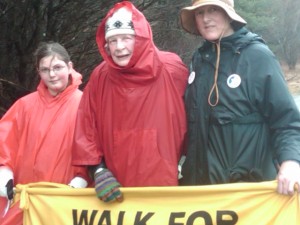Last week I spent some invigorating time in the Maine cold and rain marching next to my mother, who will be 89 this month. One day, my daughter, who is 11, joined us. We all walked 10 or 12 miles that day, and the walking was remarkably easy; it helped me understand how Thoreau used to walk 4 miles each way into town and think nothing of it.
We walked in front of two Buddhist monks drumming and chanting, and behind a banner announcing a walk to end nuclear weapons and nuclear power. Sponsored by the Peace Pagoda in Massachusetts, this march—which got special publicity on account of my mother—is one of four walks that will converge on the George Washington Bridge and march to the UN on March 2.
The march gave me plenty of time to think and to physically absorb some psychic changes that have been percolating in me since I last blogged on Harriet. And it reminded me again about the connection between walking and poetry.
Here are some thoughts, and a conclusion:
1. I feel more and more that all of us are part of one whole. When I look in people's eyes nowadays, I often see myself looking back at me.
2. My architect friend Ben Jacks organized the exhibit Walking, Poems, Buildings, in part, to show the connection between walking and poems. Remember Wordsworth composing all of "Tintern Abbey" in his head on a long walk, before returning home to write it down?
3. The organizers of the march wrote, "each step a prayer for peace." The same could be true of each foot in a line of a poem.
4. The walking was easier because of the beat of the drum, the chant of the monks, and the company of other wakers.
Rachel Zucker asks, what do we think poems DO? My answer today is, we are all connected, and it seems to me that poems use the physical rhythms of language to help us know that. This is not to say that all poetry needs to be "uplifting" or spiritual—any poem that works, in any way, is building off of, and so reinforcing, the connection.
Where does poetry want to walk to? Where could it possibly want to walk to, but a connected place?
Footsteps, drumming, rhythm make the connection. That's poetry's walk.
Annie Finch is a poet, translator, cultural critic, and performance artist. She is the author of seven...
Read Full Biography


